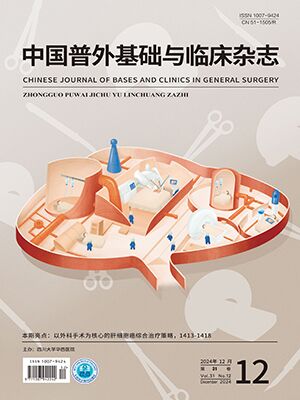| 1. |
赵永亮, 余佩武, 钱锋, 等.远端进展期胃癌腹腔镜辅助与开腹根治术的远期疗效比较[J].中华普通外科杂志, 2011, 26(9):713-716.
|
| 2. |
Ohtani H, Tamamori Y, Noguchi K, et al. A meta-analysis of randomized controlled trials that compared laparoscopy-assisted and open distal gastrectomy for early gastric cancer[J]. J Gastrointest Surg, 2010, 14(6):958-964.
|
| 3. |
徐大华.腹腔镜-内镜技术在外科的应用进展[J].中华实验外科杂志, 2012, 29(1):10-12.
|
| 4. |
中华医学会外科分会腹腔镜与内镜外科学组.腹腔镜胃癌手术操作指南(2007版)[J].中华消化外科杂志, 2007, 6(6):476-480.
|
| 5. |
日本胃癌学会.胃癌治疗指南修订第3版[M].东京:金源出版株式会社, 2010:7-20.
|
| 6. |
黄昌明, 林建贤, 郑朝辉, 等.腹腔镜辅助胃癌根治术淋巴结清扫效果的临床对照研究[J].中华外科杂志, 2011, 49(3):200-203.
|
| 7. |
毛婧, 马继春, 姜雷, 等.我国腹腔镜D2淋巴结清扫术联合远端胃癌切除术治疗进展期远端胃癌安全性和疗效的系统评价[J].中国普外基础与临床杂志, 2014, 21(6):707-715.
|
| 8. |
余佩武, 钱锋, 郝迎学, 等.腹腔镜胃癌根治术726例的疗效分析[J].中华消化外科杂志, 2011, 10(1):44-47.
|
| 9. |
王卫军, 方钱, 王国平, 等.腹腔镜胃癌根治术对患者机体细胞免疫功能的影响[J].中华实验外科杂志, 2013, 30(1):150-152.
|
| 10. |
许威, 刘宏斌, 韩晓鹏, 等.腹腔镜胃癌根治术对高龄患者免疫功能及近期疗效的影响[J].中国现代普通外科进展, 2013, 16(9):744-746.
|
| 11. |
Veenhof AA, Sietses C, von Blomberg BM, et al. The surgical stress response and postoperative immune function after laparoscopic or conventional total mesorectal excision in rectal cancer:a randomized trial[J]. Int J Colorectal Dis, 2011, 26(1):53-59.
|
| 12. |
Wang G, Jiang Z, Zhao K, et al. Immunologic response after laparoscopic colon cancer operation within an enhanced recovery program[J]. J Gastrointest Surg, 2012, 16(7):1379-1388.
|




